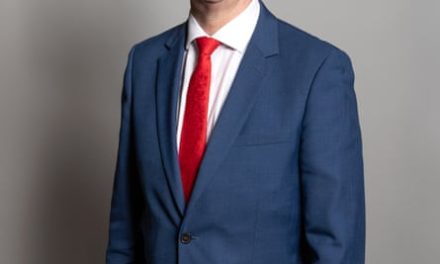Nigel Farage has said that the newly installed boss of Coutts has offered to keep his accounts there open, reversing a decision that triggered a scandal and the resignation of the private bank’s previous chief executive.
The former Ukip leader said he welcomed the offer but was still taking legal action against NatWest, which owns Coutts, demanding compensation, a full apology and a face-to-face meeting with the banking group’s bosses.
Peter Flavel resigned as Coutts chief executive last Thursday, less than two days after the NatWest boss, Alison Rose, also stepped down over her role in the row. Flavel has been replaced by Mohammed Syed.
“The new CEO of Coutts … has written to me to say I can keep both my personal and my business accounts, and that’s good, and I thank him for it,” Farage said on GB News on Monday night.
“But enormous harm has been done to me over the course of the last few months … It has taken up a huge amount of my time and it has cost me, so far, quite a lot of money in legal fees. So I have today sent a legal litigation letter to Coutts, where I want some full apologies, I want some compensation for my cost.
“But more important than all of that, I want a face-to-face meeting with the bank’s bosses. I want to find out how many other people in Coutts or NatWest have had accounts closed because of their political opinions. And I want to make sure this never happens to anybody else ever again.”
Farage obtained documents from Coutts showing that while he had been below the bank’s “commercial criteria” for some time – referring to its requirement to hold £1m in investments or loans, or £3m in savings – the decision to shut his accounts was also based on concerns that his “xenophobic, chauvinistic and racist views” posed a risk to its reputation.
Banks are not allowed to shut accounts or deny services because of customers’ political views or beliefs.
Farage did not clarify whether he had accepted Coutts’s offer to keep his account open. NatWest Group said it could not comment on individual customers.
His comments came hours after the City regulator urged NatWest shareholders, including the UK government, to “choose stability”, suggesting they should resist calls for the group’s chair, Howard Davies, to resign over the ballooning scandal linked to Farage’s accounts.
NatWest is still reeling from Rose’s shock resignation, after late-night interventions by Downing Street last week. It came after she admitted discussing Farage’s account closure with a BBC journalist.
Farage wants more heads to roll at NatWest – which is still 38.5% government-owned after its 2008 state bailout – but on Monday the Financial Conduct Authority (FCA) called for calm.
“The economic secretary to the Treasury [Andrew Griffith] just last week mentioned that he had confidence in Howard Davies, the current chair,” the FCA’s director for consumer matters and competition, Sheldon Mills, said. “I agree with his view that it’s important to have stability at NatWest and that having a chair remain in place will help support that.”
after newsletter promotion
When asked whether the FCA was officially backing Davies, Mills said: “It’s the FCA’s position that ultimately that’s a decision for the board, a decision for that institution, and its shareholders.
“We urge those shareholders and the board to achieve stability within that institution.
“What we are interested in is that banks and the banking system is stable and that consumers have trust and confidence in it. And what we will continue to do, as we have done in the past few weeks, is to support banks and boards in getting to the right decisions or solutions in relation to that.”
When asked whether the FCA was concerned about the potential breach of client confidentiality related to Rose’s discussions with the BBC, Mills said the regulator would look closely at the matter once NatWest’s independent review was completed.
The review, which is being led by the law firm Travers Smith and will probably run until the end of October, will look into any leaks of confidential customer information to the media, and why Farage’s accounts at Coutts were closed. It will also review how internal reports about his political views and actions were compiled.
Mills said the scandal had shed light on whether banks had the right systems and processes in place regarding account closures, adding that while some accounts would have to be closed if banks suspected financial crime including money laundering, “it’s really important that banks are not terminating on the basis of some of these political views”.
Mills said he welcomed the City minister’s work to strengthen protections for bank customers, including by increasing the notice they must give for account closures from 30 to 90 days.
Join the exciting world of cryptocurrency trading with ByBit! As a new trader, you can benefit from a $10 bonus and up to $1,000 in rewards when you register using our referral link. With ByBit’s user-friendly platform and advanced trading tools, you can take advantage of cryptocurrency volatility and potentially make significant profits. Don’t miss this opportunity – sign up now and start trading!








Recent Comments